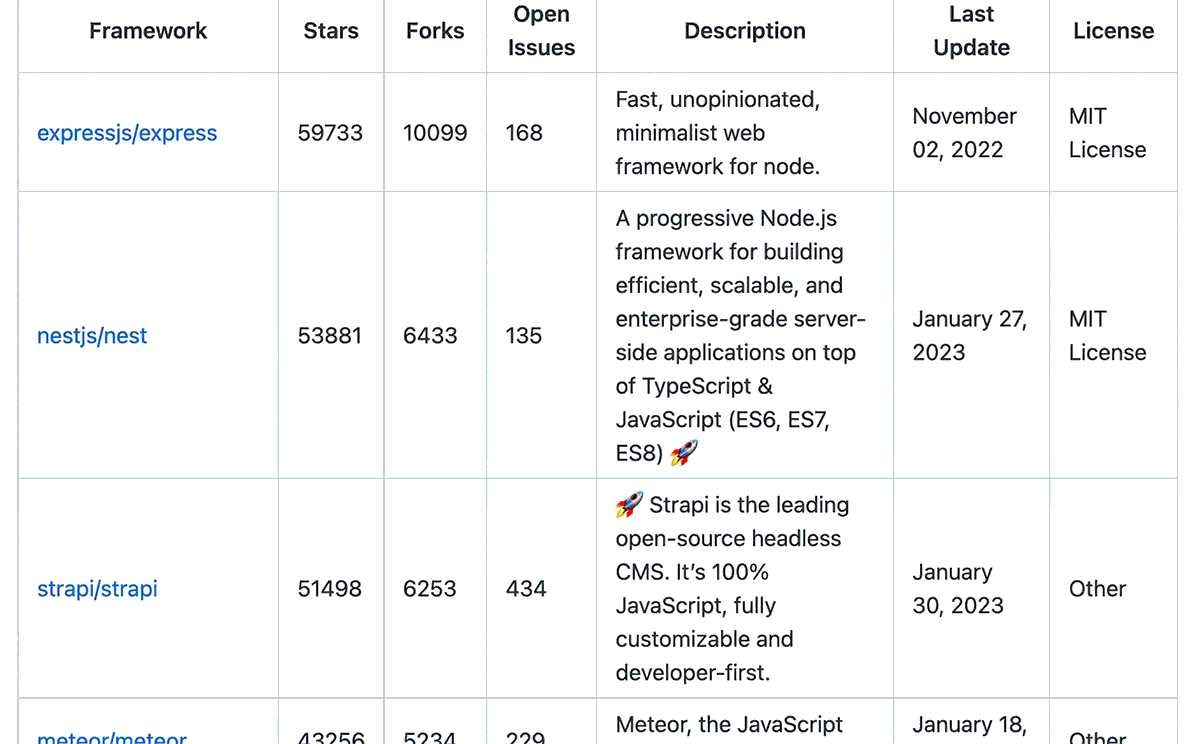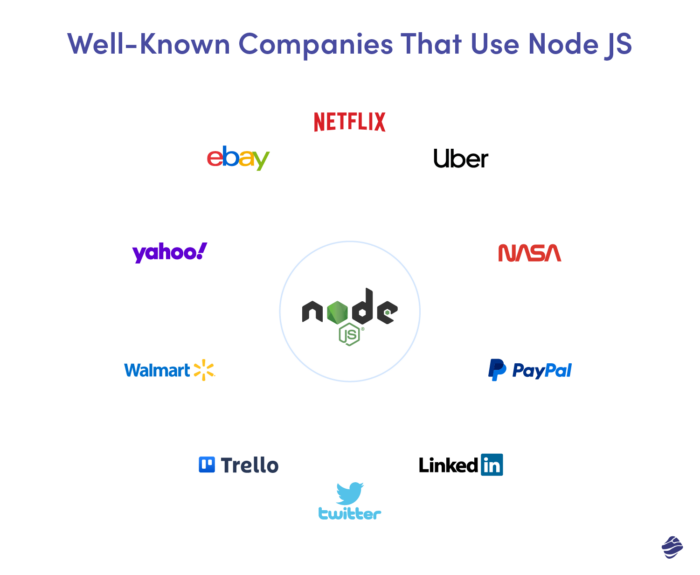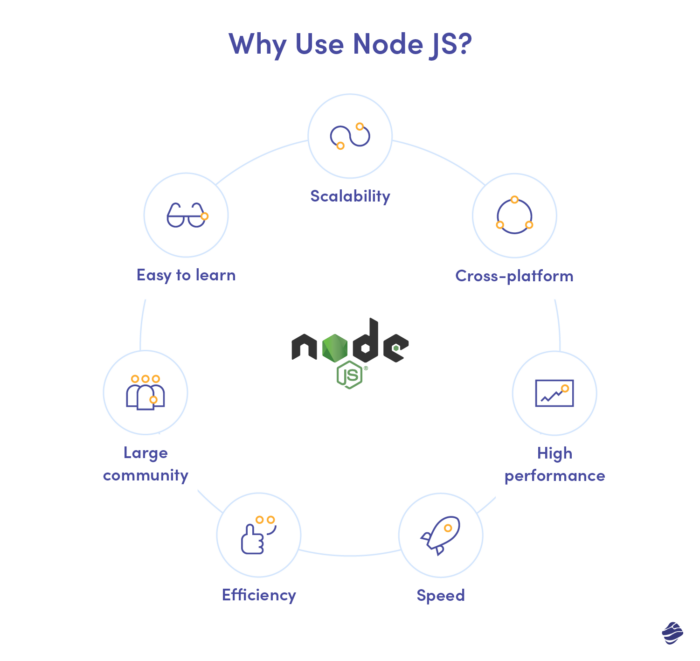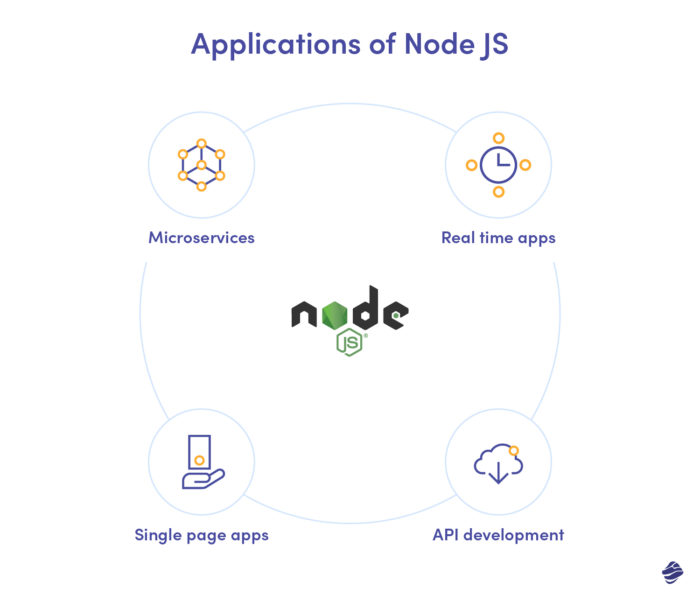In recent years, Node JS has gained widespread popularity among developers, businesses, and enterprises. Node JS is an open-source, cross-platform JavaScript runtime environment that allows developers to build scalable and high-performance apps. Many enterprises and businesses are choosing Node JS web development for their projects, and there are many key reasons why. In this article, we will explore why you should consider using Node JS for your enterprise project.
What is Node JS?
Node JS is used for backend development. To fully understand what Node JS is and how it works, it’s a good idea to familiarise yourself with the basics of backend development first.
So what is Node JS? Node JS is a server-side platform that allows developers to build high-performance apps using JavaScript. Node JS uses an event-driven, non-blocking I/O model, making it ideal for building fast and scalable apps. With Node JS, developers can build server-side apps, web development, and even mobile apps using frameworks such as Express, Koa, and Sails.
A non-blocking I/O model is a programming model that allows an app to continue processing other tasks while waiting for input/output operations to complete. So with Node JS, when an app makes an I/O request (such as reading data from a file or a network socket), the app will block and wait until the operation completes before it can proceed with other tasks. Node JS's non-blocking I/O model is one of its key features that makes it an efficient and performant platform for building scalable apps.
In addition, Node JS also has a massive ecosystem of modules, libraries, and tools that allow developers to build apps faster and ensure that they have fewer bugs. The Node JS ecosystem includes popular tools like npm (Node Package Manager), which is used to manage dependencies and packages.

What can you do with Node JS?
But what can you actually do with Node JS? Enterprises and businesses can use Node JS to build scalable, high-performance apps that can handle a large number of simultaneous connections with ease. Node JS can be used to develop web apps, mobile apps, real-time apps, and APIs. It is also ideal for building microservices, which can help reduce the complexity of large apps and improve overall system performance. Node JS can also be used to build single-page apps (SPAs), which load a single HTML page and dynamically update the page as the user interacts with it.
Node JS's speed and scalability make it a great choice for businesses that need to build apps that can handle high traffic volumes and need to be fast and efficient. One example of this is LinkedIn, one of the most well-known professional networking platforms used by millions of people around the world. LinkedIn is a perfect example of what you can do with Node JS: it enables the platform to handle a lot of connections at once due to its non-blocking I/O model - essential for a platform with millions of users.
LinkedIn uses Node JS in several ways to power its platform. One of the main ways LinkedIn uses Node JS is to handle a large number of simultaneous connections from users. Node JS's enables LinkedIn to handle these efficiently, allowing users to interact with the platform in real-time.

Additionally, LinkedIn uses Node JS to build microservices, which are small, independent services that work together to power the platform. These microservices enable LinkedIn to break down its platform into smaller, more manageable components, which can be developed and deployed independently. The result is that LinkedIn is able to deliver fast and responsive user experiences, which is crucial for a platform that relies on user engagement.
LinkedIn also uses Node JS to build real-time features, such as chat and notifications. Node JS's ability to handle real-time data streams makes it a great choice for building these features, which are critical for a social networking platform.
Why use Node JS?
As an enterprise, why use Node JS over other backend development languages? There are several reasons why a business or enterprise may choose to use Node JS.

Node JS allows scalability
One of the biggest advantages of using Node JS for enterprise application development is its scalability. Node JS is designed to handle a large number of simultaneous connections with minimal overhead. This makes it ideal for building apps that need to handle a high volume of traffic.
The event-driven, non-blocking I/O model we mentioned allows developers to build scalable apps without having to worry about performance issues.
Speed
Node JS is also known for its speed. It uses the V8 JavaScript engine, which is the same engine used by Google Chrome. This means that Node JS can execute JavaScript code faster than other platforms. Additionally, Node JS uses an event-driven, non-blocking I/O model, which allows it to handle requests quickly.
This speed is especially important for enterprise apps, where every second counts. By using Node JS, developers can build apps that are fast and responsive, providing a better user experience.
Efficiency
Efficiency is another reason why Node JS is a great choice for your enterprise project. Node JS allows developers to write both client-side and server-side code in JavaScript, which means that you can reuse code across both sides of your app. This can help to reduce development time and make your codebase more maintainable.
Additionally, Node JS has a large ecosystem of modules and libraries that can help to speed up development time. These modules and libraries can be easily installed using npm, which is Node JS's package manager.
Cross-platform
Node JS is also cross-platform, which means that you can run it on any operating system. This makes it ideal for building apps that need to run on multiple platforms. Node JS is also compatible with many other technologies, making it easy to integrate with other systems. Find out more about the benefits of cross-platform apps here.
High performance
Node JS is built on top of the V8 JavaScript engine, which is known for its high performance. This allows Node JS to handle a large number of concurrent connections and requests with ease, making it ideal for building high-performance web apps.
Large community
Node JS has a large and active community of contributors who continuously improve the platform and its ecosystem by creating new libraries, tools, and frameworks. This community is constantly sharing knowledge, best practices, and ideas, which makes it easy for developers to find help, solve problems, and collaborate on projects.
The large community of Node JS also means that there are many resources available online, such as tutorials, documentation, and forums. This makes it easy for developers to learn the language and its associated tools and frameworks. As an enterprise, this means that finding a Node JS developer an easy task, as there are so many out there with extensive experience.
Another advantage of Node JS's large community is that it helps to ensure the stability and security of the platform. With so many users and contributors, issues and vulnerabilities are identified and fixed quickly, and the platform is constantly evolving to meet the changing needs of developers and users.
Easy to learn
Node JS uses JavaScript as its programming language, which is widely used and familiar to most developers. This makes it easy for businesses to find developers who can work with Node JS and build apps quickly.
Moreover, Node JS's ease of learning can help to increase the productivity of developers, allowing them to quickly develop applications and features. This can result in faster time-to-market and better overall business outcomes.
Where to use Node JS?
Now you understand the benefits of Node JS, where to use it is the next question you may have. Whether you're a web developer looking to build a chat app or a software architect looking to build a microservices architecture, Node JS may be the perfect option for the job. Here are some of the key areas where Node JS excels.

Real time apps
Node JS is perfect for building real-time apps, such as chat apps, gaming apps, and collaboration tools as it is great for handling real-time data and updates.
API development
Node JS is also great for building APIs (app Programming Interfaces). APIs are used to connect different systems and apps, and Node JS makes it easy to build them to be both fast and scalable.
Single page apps
Node JS is also ideal for building single page apps (SPAs). SPAs are web apps that load a single HTML page and dynamically update the page as the user interacts with it. Node JS's speed and scalability make it an ideal tool for building SPAs.
Microservices
Node JS is also great for building microservices, which are small, independent services that work together to communicate with each other through APIs (app Programming Interfaces). Each microservice is responsible for a single business capability and can be developed, deployed, and scaled independently of other services.
As Node JS can handle a large number of concurrent requests without blocking the event loop, it is ideal for building microservices that need to handle a large number of requests and respond quickly.
Why Node JS might be better than other backend development languages?
When researching backend development languages, you may come across Golang as well as Node JS. Both Node JS and Golang are two popular methods that are used to build server-side apps. Although they are both designed for server-side development, they have some fundamental differences in terms of their architecture, performance, and usage.
Golang is a statically typed, compiled language developed by Google. Golang is known for its speed, simplicity, and scalability. The choice between Node JS and Golang will depend on the specific requirements of your app. If you need high performance, concurrency, and scalability, Golang may be the better choice. If you require real-time updates, efficient I/O operations, and prefer the simplicity of JavaScript, then Node JS may be a better fit for you. Find out more about the differences between Node JS and Golang in our blog.
Why use Node JS for your next project?
In this blog we have explored the question: why us Node JS? The answer is that it is a powerful and versatile platform that offers several key advantages for businesses and enterprises. With its scalability, speed, efficiency, cross-platform compatibility, and high performance, Node JS is an ideal choice for building apps that need to handle high volumes of traffic and provide fast, responsive user experiences.
Companies like LinkedIn have successfully used Node JS to power their platforms, and its massive ecosystem of modules and libraries allows developers to build apps faster and with fewer bugs. If you're looking for a powerful platform to build your next enterprise project, Node JS is definitely worth considering.







